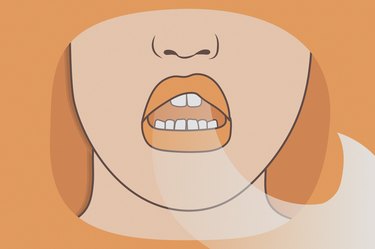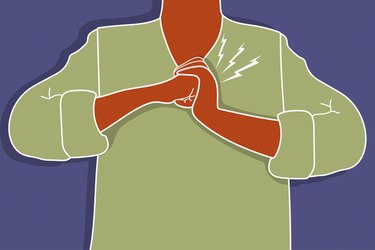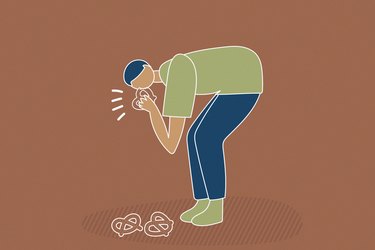
We've all gone a day or two where a stuffy nose forces us to breathe with our mouth wide open. But if you're mouth-breathing all the time, is that a problem?
The answer is a big, resounding yes, according to health experts in multiple fields.
Video of the Day
Video of the Day
"Nose-breathing is the body's natural way of ensuring that we get the oxygen that we need," says Mandy De Vries, RRT, RRT-NPS, respiratory therapist and director of education at the American Association for Respiratory Care (AARC).
Inhaling through your mouth, on the other hand, can lead to minor annoyances and also set the stage for serious health risks.
Here's a look at the effects of mouth-breathing and how to break the habit.
Common Reasons for Breathing Through the Mouth
People tend to breathe through their mouth if there's an underlying problem that makes it difficult to breathe through their nose:
- Nasal congestion: This is the main culprit, says Brian Sanders, MD, an otolaryngologist with ENT and Allergy Associates in Yonkers, New York. Congestion can sometimes be from a cold, a sinus infection or undermanaged seasonal allergies.
- Structural issues: Some of the most common include a deviated septum, swollen nasal passages or nasal valve collapse, Dr. Sanders notes.
- Nasal obstruction: This could be a nasal polyp, obstructive adenoid glands or a mass or growth in the nasal cavity. (Many of these problems can also cause a chronically runny nose.)
The Effects of Breathing Through Your Mouth
Dentists aside, nobody wants to stare into someone else's open mouth. But politeness isn't the only reason why you're better off breathing with your kisser clamped shut. Open-mouth breathing can actually be bad for your health. Here's why:
1. It Can Lead to Dry Mouth
Having your mouth ajar for long stretches causes your saliva, which normally keeps your mouth tissues hydrated, to evaporate, per the Cleveland Clinic. As a result, your mouth is more likely to feel dry or chalky.
2. It Can Make Your Breath Stink
In addition to helping your mouth stay moist, saliva helps keep bacteria at bay. When your mouth gets dry, nasty bugs start to flourish that can make your breath stink, according to the Cleveland Clinic.
3. You Might Get More Cavities
Over time, a mouth-breathing habit can up the risk for tooth decay.
"Our saliva acts as a buffer to protect our teeth," says Richard Lipari, DDS, a dentist in Chappaqua, New York. "When our mouth is dry we have less of that protection and the chance for cavities increases."
4. You Might Be More Prone to Respiratory Infections
The more you breathe through your mouth, the more likely you might be to catch a cold.
Air that reaches the airway through the mouth tends to be colder, dryer, and less filtered than air coming in through the nose (we'll explain why a little later). This can cause the airways themselves to become dryer and more irritated, making them more susceptible to infection, De Vries says.
5. It Increases Your Risk for Sleep Apnea
Perhaps worst of all, mouth-breathing can make it harder to get a good night's sleep, which can have a serious domino effect on your health.
"Mouth-breathing can cause the throat and surrounding muscles to weaken over time. This weakening can lead to snoring or sleep apnea," De Vries explains.
If left untreated, that could lead to problems including daytime fatigue, high blood pressure, heart problems and type 2 diabetes, per the Mayo Clinic.
Why Breathing Through Your Nose Is Better
By now, you've likely concluded that your nose is a better air-intake vehicle than your mouth. But what makes it so superior? Turns out, the nose were pretty much designed for optimal breathing.
"Our nasal passages play an important role in humidifying and warming the air we breathe as well as filtering out dust and allergens," Dr. Sanders says. "Bypassing this process with chronic mouth-breathing leads to colder, drier, unfiltered air directly entering our trachea and lungs." Which, in turn, can lead to some of the problems listed above.
Is Breathing Through Your Mouth Ever OK?
Mouth-breathing allows you to take in more air than you would by breathing through your nose. That can actually be helpful in some instances, provided you only do it for short periods.
"If you are exercising and your nose is congested, it can be helpful to breathe through your mouth so that you can get more oxygen," De Vries says. "Additionally, if you are sick and your nose is congested, breathing through your mouth can help to clear out your sinuses."
How to Stop Breathing Through Your Mouth
It's possible to get back to breathing through your nose, but you might need some help to get there if mouth-breathing has become your default.
1. See your primary care doctor: The first step is to see your doctor to figure out what the underlying cause might be. If the problem is something like poorly controlled seasonal allergies, for instance, better allergy management habits or taking an allergy medication might be enough to curb your congestion so you can breathe through your nose.
2. Meet with a respiratory therapist: This type of specialist can help you learn techniques to get you back into the habit of nose-breathing. "We can provide guidance on how to best use nasal strips or other devices to improve airflow," De Vries says.
3. Make an appointment with an ENT: If your doctor suspects your mouth-breathing is related to a nasal blockage, they might refer you to an ear, nose and throat doctor. The ENT can perform an exam to see if the problem is caused by something like a deviated septum, nasal swelling or nasal valve collapse and recommend the appropriate treatment.
"While nasal septal deviation itself can only be corrected with procedural treatments, swelling of the inferior turbinates or adenoids can be improved with topical nasal sprays, and nasal valve collapse can be improved with wearable nasal dilators," Dr. Sanders says.
So, How Bad Is Mouth-Breathing, Really?
The body is designed to take in air primarily through the nose.
"It's best to breathe through the nose whenever possible," De Vries says.
So while it's fine to inhale through your mouth for short stretches, like while you're exercising or if you're congested from a cold, you should let your doctor know if you're breathing through your mouth all the time. Together, you can figure out the underlying cause so you can get back to breathing normally.
Was this article helpful?
150 Characters Max
0/150
Thank you for sharing!
Thank you for your feedback!
Is this an emergency? If you are experiencing serious medical symptoms, please see the National Library of Medicine’s list of signs you need emergency medical attention or call 911.






